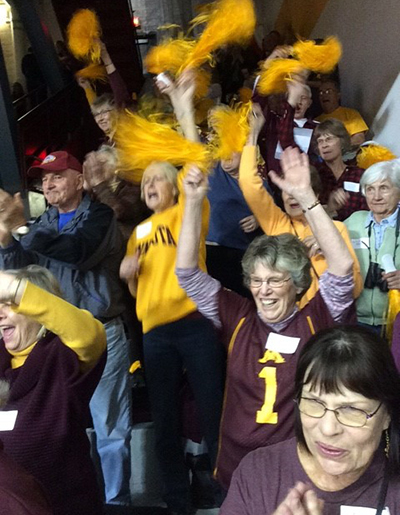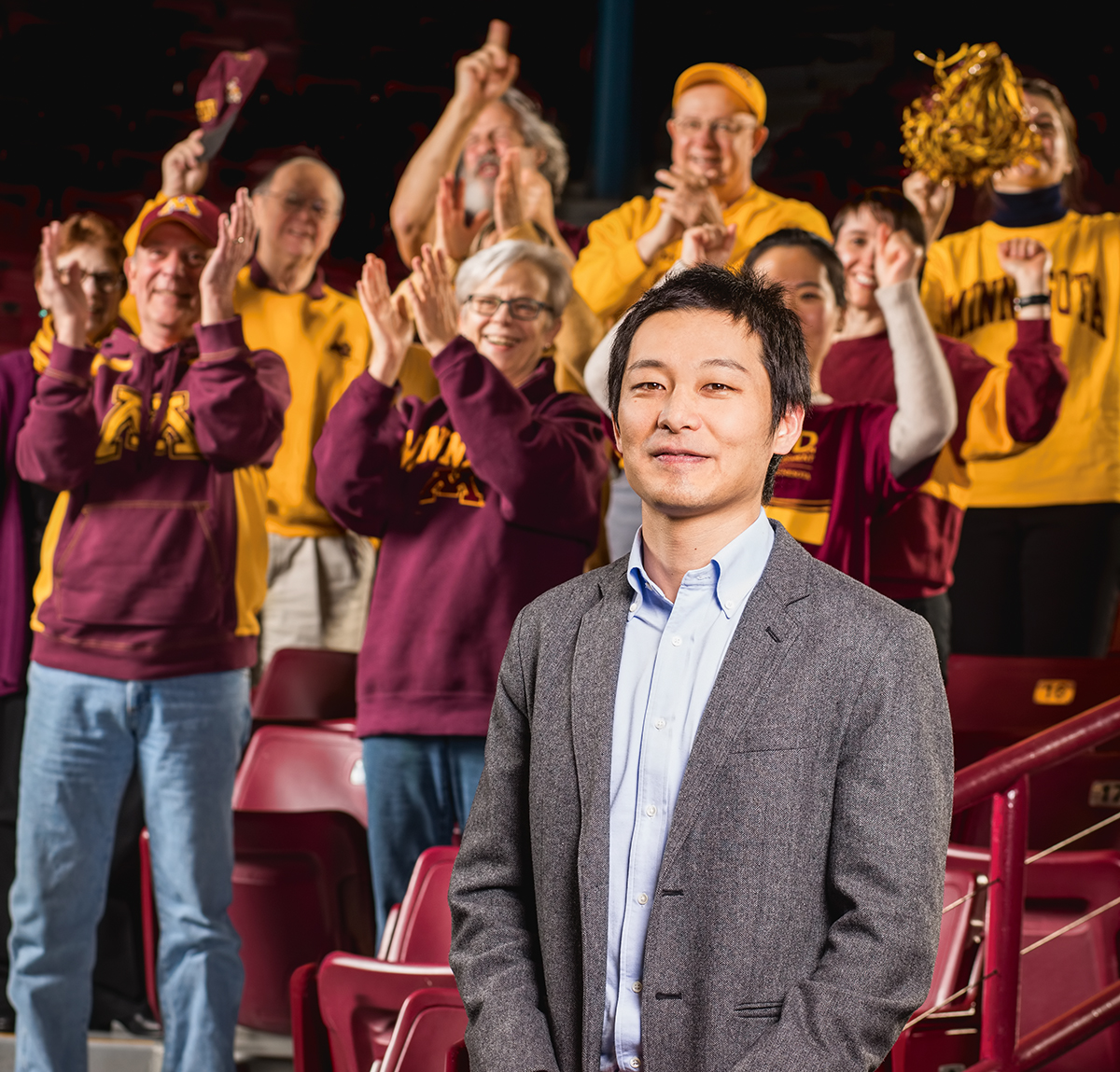When Yuhei Inoue was a boy in Yamaguchi, Japan, he shared a love of sports with his grandfather. The elder Inoue was a fan of the Tokyo Yomiuri Giants, the professional baseball team of the capital city, where he had attended college many years earlier. That was not the local team, but the younger Inoue became a Giants fan like his grandfather.
Together the two followed the national high school baseball tournament, too. And they followed the Ekiden, a long-distance relay race famous in Japan.
The younger Inoue grew up to love sports as a spectator, participant, and later as a scholar. Today he is an avid marathoner, running to and from work at the University’s School of Kinesiology almost every day, rain or shine, on ice or snow.

Inoue knows that the closeness he felt to his late grandfather was due in part to their shared love of sports. Their relationship strongly influenced his understanding of sport and human connections, especially across generations. It spurred his curiosity and interest in sport’s positive social impact for everyone.
Since embarking on his faculty career, Inoue documented broad intangible social benefits of a professional golf tournament in Memphis, Tennessee. In Japan, he found that people severely affected by the 2011 earthquake and tsunami who connected with local professional soccer teams were better able to recover from the tragedy. In Cambodia, he discovered complex ways that local citizens had experienced health benefits connected to the Angor Watt International Half Marathon, established in 1995 after the country’s shattering civil war.
Inoue’s research is at the pioneering edge in the field of sport management. And lately his focus has turned to older adults.
Learning from survivors
It was working in Japan after the tsunami that Inoue started thinking about the implications of his work for older adults.
“Dealing with a population devastated as a result of an earthquake led me to think that sport could provide benefit to other disadvantaged populations,” he says. “I decided to focus on a group that was perhaps at high risk in the sense of social isolation, lacking resources, and so on.”
Worldwide, the population of older adults—generally considered to be 65 and older—is expected to grow for the next 20 to 30 years. Not all are disadvantaged— many feel happy, relatively secure financially, and socially and emotionally supported. But a significant part of this population lacks resources and is socially isolated and generally disadvantaged. In addition, it is estimated that nearly 20 percent of older adults suffer from some form of mental illness. And a common experience of aging is confronting the loss of physical abilities.
With this in mind, Inoue thought he might be able to apply his earlier research to help older adults. How can sport spectatorship positively impact a sense of belonging among older populations?
Part of the team
There are two ways that sport spectatorship can lead to a sense of belonging. One is by attending sporting events where a person is positively influenced by a stronger sense of emotional support and the sense of belonging to a larger community. Research has shown that a live sports game is a unique physical environment. Compared to watching on television, attending in person means connecting with different people than those encountered in everyday life.
“It’s not just about your friends but also about people seated next to you in random interactions,” says Inoue.
But even huge gatherings like the Minnesota State Fair are not socially sanctioned places to display emotions.
“Sports are a rare environment. It’s okay to cry, it’s okay to scream—with sports, that’s what you do!”
The second way sport spectatorship leads to sense of belonging is by fans becoming psychologically connected to the sport team, which also increases the perception of emotional support from other sports fans. By merely activating one’s sense of social and psychological identification with the sport team, a person begins to feel a part of that team. “Team identification” increases the sense of emotional support.
“If you are following a sports team, you are also supporting that team’s community,” Inoue explains. “You are essentially building connections with the many other people who are supporting the team and, by extension, with the larger community, whether they are involved in sports or not.”
A Minnesota pilot study
To understand the potential for sport spectatorship to support older adults in particular, Inoue teamed up with a pioneer in the study of sport fandom and the social-psychological impact of team identification on fans’ sense of community. With Daniel Wann, a psychology professor in Kentucky, Inoue won funding for a pilot study from the North American Society for Sport Management, the most prestigious professional organization in the field.

Locally, Inoue connected with Steve Pieh, BS ’76, director of Minnetonka Senior Services, who organizes social activities for older adults in the Minnetonka area. Pieh also happens to be a big U of M sports fan, so he was definitely interested in Inoue’s project. Working with Pieh, Inoue was able to recruit participants from a senior center for the pilot study.
Half of the study participants attended three U of M volleyball games in person. The others did not. Inoue and master’s student Chris Moore conducted surveys of all study participants before and after.
The results: Those who attended the games reported feeling a closer bond to the volleyball team—and to the senior services center.
“Attending a sporting event positively influenced a sense of emotional support from other fans of the volleyball team, including people from the senior center group,” Inoue says. Excitement about the experience extended to the round-trip bus ride.
Results were not all rosy. Those who attended the games experienced challenges of the game environment itself that were unfriendly to older adults, including uncomfortable seating, very loud volume, many stairs to negotiate, and poor temperature regulation. Because of the way advertising was conducted, those who were not selected to attend the games were unhappy. And perhaps most significantly, the participants overall were neither disadvantaged nor isolated but successfully retired with stable incomes and families nearby.
Based on the findings, Inoue is conducting a follow-up study in an online survey of 600 older adults living in 50 counties across the United States. This one is designed to test findings from the first study, make the results more generalizable, and build out into a solid model for the relationships he found.
Opening doors for generations
Inoue hopes to eventually conduct an even larger study to focus on older adults at higher risk of isolation and with fewer economic resources, exploring sport-event participation as one effective way to promote a sense of belonging and solve issues of social isolation.
In the meantime, he is developing an associated theory: that it’s not just about the strength of the psychological connection with a team and the fans but access to the psychological connection through social connections that is important. Attending a sport event, whether a person feels connected to a participating team or not, can provide access to positive forces that support well-being—a greater feeling of emotional support and a stronger sense of belonging.
Inoue also hopes that sport teams can use the results of his research to pay more attention to older populations’ needs, from transportation to facilities. He’d like to work directly with senior service centers to work on such ideas as creating fan groups and opportunities to attend games or watch them on TV together. That means not just professional teams but college and youth teams—he thinks his research could see a stronger effect with youth sports, where fans are supporting children.
As a researcher and teacher, Inoue, inspired by his grandfather, is supporting the next generation of scholars.
“I don’t want to just carry the knowledge,” he says. “I hope to use it to improve actual practice and share it with my students. They are the future managers of the sports industry and the ones responsible for shaping it into the future.”
Read more about the sport management program in the School of Kinesiology.
Story by Jonathan Sweet and Gayla Marty | Photos by Tj Turner | Spring/Summer 2018
 Kinesiology professor Yuhei Inoue joins Gophers fans in Williams Arena.
Kinesiology professor Yuhei Inoue joins Gophers fans in Williams Arena.